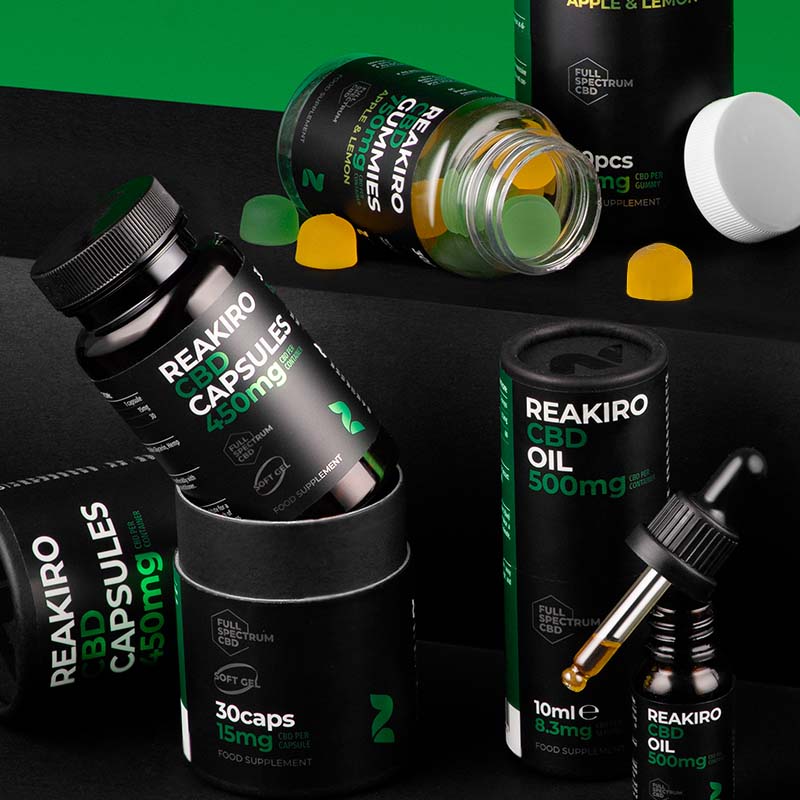Table of Contents
This substance doesn't make you feel high, is safe and not addictive (according to the WHO report), and can be used in food and cosmetics. Enter CBD – a natural component of cannabis (hemp) that is gaining popularity in the global health and wellness market. What is this remedy, and how does CBD make you feel? Let's find out.
Types of CBD: Full-Spectrum, Broad-Spectrum, Isolate, and More Explained
As CBD continues to gain popularity, it's important to understand the different forms this versatile compound can take. There are various types of CBD, from full-spectrum and broad-spectrum to isolates and nano-CBD. Each one has its own benefits, which are suited to different needs and preferences. Whatever you're looking for, whether it's the comprehensive entourage effect, THC-free options, or faster absorption, the diverse range of CBD products means there's something for everyone.
- Full-spectrum CBD:
Full-spectrum CBD contains in it all the naturally occurring compounds found in the cannabis plant. It also includs other cannabinoids (like THC), terpenes, and flavonoids.
What's in it for me? This type is thought to give the "entourage effect", where all the compounds work together in a synergy way to improve the overall therapeutic benefits.
Just a heads-up: It might contain a little bit of THC, which could be a problem for people who don't want to get high or who have to take drug tests regularly.
- Broad-spectrum CBD:
Broad-spectrum CBD includes lots of different cannabinoids, terpenes, but it usually doesn't have any THC in it.
The benefits are: It offers some entourage effect benefits without the risk of THC's psychoactive effects.
Just a few things to think about: This is ideal for anyone who wants to avoid THC but still get the benefits of other cannabis compounds.
- CBD Isolate:
Considered to be the purest form of CBD, isolated from all other cannabis compounds. It usually comes in a crystalline or powder form.
What's in it for you? It doesn't contain THC, so it's great for anyone who's sensitive to other cannabinoids or wants to make sure there's no THC in their system.
Just a few things to think about: It doesn't have the entourage effect because it doesn't contain other cannabinoids or terpenes.
How Does CBD Affect Our Body?
We've talked about the different types of CBD, but what happens when CBD enters our body? All the systems in our bodies work together to keep us healthy, and one of these is the endocannabinoid system. Our bodies already have this biological system that can interact with cannabis chemical compounds, such as CBD and THC.
In short, an endocannabinoid system is a group of unique fatty acids based on signalling chemicals, their receptors, and metabolic enzymes that produce and break them down. These endocannabinoid chemical signals act on similar cells in the brain and immune system (CB1 and CB2), as do the active compounds found in cannabis: cannabidiol (CBD) and tetrahydrocannabinol (THC).
CBD vs. THC: What Can You Expect?
Each of our endocannabinoid systems is different. So, the effects of CBD as well as THC will vary from person to person.
- CBD (cannabidiol) is non-psychoactive and doesn't get you high or mess with your mind. It has many benefits and is researched for its therapeutic properties. For example, CBD is believed to reduce anxiety and promote a sense of calm. According to 2021 research in the UK, the top four reasons for CBD use were self-perceived anxiety (42.6%), sleep problems (42.5%), stress (37%), and general health and well-being (37%).
- THC (tetrahydrocannabinol) is a psychoactive ingredient in cannabis. It's known for producing a "high" by binding to cannabinoid receptors in the brain. This psychoactivity affects how we perceive, feel and think, which can lead to a euphoric experience. THC is used for pain relief as an appetite stimulant, which is helpful for people who lose their appetite due to conditions like HIV/AIDS or cancer. According to research in the US and Canada, the most common reasons for using THC products are to manage pain (53%), sleep (46%), headaches/migraines (35%), appetite (22%), and nausea/vomiting (21%). For mental health reasons, the most common were for anxiety (52%), depression (40%), and PTSD/trauma (17%). Just 11% of respondents said they used cannabis to manage other drugs or alcohol, while 4% said it helped with psychosis.
As we conclude, CBD doesn't have the same effects as THC and is not on the World Health Organization’s banned list. Hence, it isn’t considered a narcotic drug that isn't addictive or toxic.
Choosing Your CBD: A Guide to Oils, Edibles, and Topicals
There are many different ways to take CBD, and you can choose the one that suits you best. From fast-acting oils and delicious edibles to targeted topicals, there's something for everyone when it comes to exploring the potential of cannabidiol.
CBD oil and tinctures, taken sublingually (under the tongue) or added to food and beverages, offer a fast-acting method for consuming CBD. When rapidly absorbed into the bloodstream, CBD provides prompt effects when taken sublingually. The flexible dosing allows for tailored usage depending on individual needs. However, some users may find the earthy, hemp taste of the oil unappealing.
CBD edibles, such as gummies, chocolates, and beverages, offer probably the most convenient and enjoyable way to consume CBD with pre-measured doses. The effects of CBD edibles take longer to set in, typically between 30 minutes and two hours, as the CBD must pass through the digestive system, which will take longer than CBD oil applied under the tongue. Once metabolised, users often experience prolonged CBD effects. This slower onset can particularly benefit those seeking extended effects throughout the day or night. The taste and variety of edibles make them a pleasant option for many users. However, the delayed onset might not be ideal for those needing immediate relief.
CBD-infused creams, lotions, balms, and salves are applied directly to the skin, targeting specific areas of pain, inflammation, and skin conditions without entering the bloodstream. Users typically experience localised relief in specific areas, making these products ideal for addressing muscle soreness or skin issues. CBD topicals are not designed to provide systemic relief, so they are best suited for treating specific problem areas rather than offering overall body relaxation or relief. The soothing application can also contribute to a feeling of comfort and targeted care.
Top Tips for First-Time CBD Users
If you're new to CBD, here are a few tips to help you get the most out of it. Following these tips will help newcomers to CBD get the most out of their first experiences and find the best way to incorporate CBD into their wellness routine.
- Always start with a low dose. Increase gradually until you find the amount that works best for you.
- Choose a product that matches your needs and lifestyle.
- Read product labels (amount of CBD per serving, third-party tested for quality and potency).
- Be patient. CBD can take time to build up in your system, and the effects might not be immediate.
- If you're on medication, it's a good idea to first consult with a healthcare professional, especially if you're new to CBD or have underlying health conditions.
- Track your experience. This can help you determine what works best for you and identify any patterns or effective dosages.
- Ensure that CBD is legal in your area and understand any regulations or restrictions regarding its use.
- Be aware that side effects are rare, but possible. Effects like drowsiness, dry mouth, changes in appetite. If you need to avoid THC, look for broad-spectrum or isolate products which contain no or minimal THC.
- Keep up to date with the latest findings and product developments in the CBD industry.
Summing Up
CBD offers many benefits without causing a high. It is safe and non-addictive and can be used in many forms, from oils and tinctures to edibles and topicals. Knowing the different types of CBD and how they work can help users make informed choices like choosing products with the entourage effect, full-spectrum CBD, or isolates. As CBD gains popularity, it's important for new users to start with a low dose, choose the right product, and consult with healthcare professionals when necessary.
Sources:
- CANNABIDIOL (CBD) Critical Review Report
- Cannabidiol in Anxiety and Sleep: A Large Case Series
- Reasons for cannabidiol use: a cross-sectional study of CBD users, focusing on self-perceived stress, anxiety, and sleep problems
- Prevalence and self-reported reasons of cannabis use for medical purposes in USA and Canada



